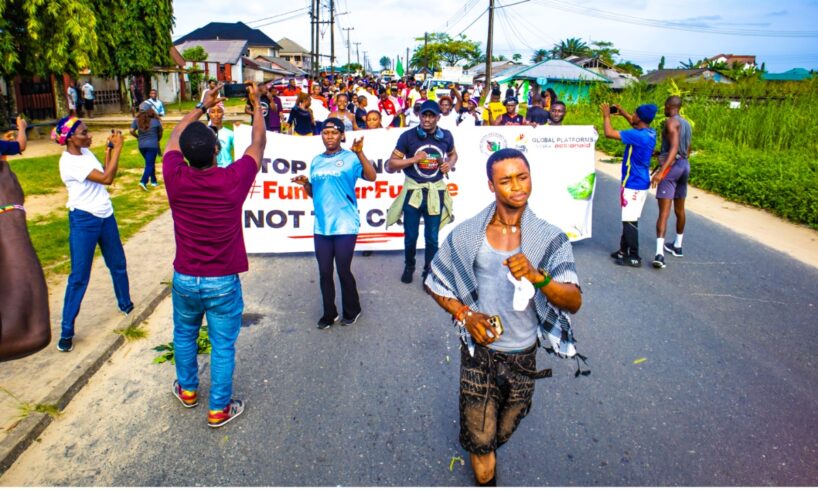
Youths of Ibeno Local Government Area of Akwa Ibom State have called on oil and gas companies in the area to fund agroecology and renewable energy for a sustainable energy transition.
Ibeno is one of the oil producing communities in Akwa Ibom which had suffered a lot of environmental and human degradation following extractive and explorative activities of the oil companies.
The youths made the call during a Die-In Protest at the local government headquarters, to mark the 2025 Global Week of Climate Action, organized by ActionAid Nigeria in collaboration with Clement Isong Foundation, CIF.
President, Ibeno Youth Advocacy Network, IYAN, Kofi Asuquo, while reeling out the negative impacts of gas flaring on lives and livelihood, said the community should be carried along in the transition process as they are the ones directly affected
“We are looking at just transition and how to bring in youths to talk about the change we need during this transition. We know the challenges we are facing in the industrial zone where gas is flared as Co3 and we are directly affected by this ecosystem transition.
“We are telling them instead of funding crises, they should fund the future, their funding should be tailored towards renewable energy, agroecology and inculcation of youths into their policy making and not just funding exploration. Whatever they do, they should carry the mindset of our people. That’s what we are agitating for in a peaceful way,” he said.
Also speaking, Friday Ogezi of ActionAid Nigeria said the protest was an avenue where young people and community-led associations advocate for climate issues in terms of policies, financing, as well as alternatives that could provide them livelihood and survival given the issues around transiting from fossil fuels to renewable energy and from industrial agriculture to agroecology.
He said Ibeno was chosen due to the industrial issues around gas flaring in the community – which by all means affect crop production.
Ogezi expressed the readiness of ActionAid to continue to advocate, campaign and speak to policy makers to see how policies around creating alternatives for fossil fuels in terms of agroecology and renewable energy are domesticated and implemented for the benefit of the people.
He said, “We are looking at the National Determining Contribution (NDC). It’s a policy that speaks to specific sectors around climate change response. How can this policy also be domesticated at local level to support the young people? How can you also have access to other alternatives?
“Now we are transiting to renewable energy, actually, what we push is we call it just transition. Now that we are transitioning, let’s not create more problems for the people. Let it be fair, let it be inclusive, let the people be involved. We have a hub within the community where we are training the youths on green skills. We have the hub fitted with computers and all of that to build young people’s skills.”
On her part, Dr. Caroline Gordian, the project lead of Clement Isong Foundation, CIF, noted that climate change affects everyone, especially Ibeno and other oil producing communities in the state due to high level of extractive activities in the area.
Gordian explained that CIF would be working towards ensuring that the voices of youth and women fit into a national statement that would be presented at CoP30.
She added, “You see now currently some oil companies divest without even decommissioning the things that they have commissioned on the ground and after a while you realize that there are so many issues affecting the environment.
“So there is that need for government and relevant stakeholders to take action. They should be able to fund just transition. Young people should be trained, women who are into fishing and farming, should be trained so that they can transit from here to there. We are very much intentional about this, believing that once all these are done, we will have climate justice.”




